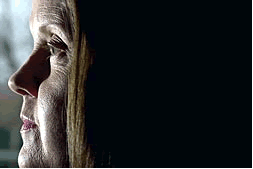

|
||||
Every
Aching Moment |
||||
| Pain patients have trouble finding medicines to stop the hurt When what seems like stage lights come on and every sound booms like an explosion, Janice Harness darkens the shades, asks for silence, reaches for an ice pack and heads to her room. Within 20 minutes of the first signs of a migraine, her head starts pounding. If she moves, the sound of her own footfall is maddening. So is the sound of a passing car or light peeking through the curtains, which seems blinding. Crying only makes the pain worse, so she takes a pill and hopes for the best. Three times a week her medicine works within a few hours, but three or four times a year, the pain won't stop for days. That's when she heads to the emergency room and tells the doctor exactly what has helped before: Nubain and Compazine in an IV. Then she is accused of being a drug-seeking addict who needs a lesser medication, if anything at all. It's a problem faced by many who live with severe pain. "Until I started having migraines, I never understood not being afraid of dying," she said, or even worse, "What if somebody leaves you lying there not to die but to suffer until you can't stand it anymore?" More than 20 million Americans suffer from migraines. Millions more deal with back pain, arthritis, cancer and other forms of pain that make them miserable. But many can't find doctors who will prescribe enough medication to fix the problem. "As I age, if the only thing holding me back is pain, I'd hope somebody would help with the pain," Harness said. "And I don't know if I'm going to find that doctor." The phobia for doctors is two-fold, said Dr. Edward Rylander of Family Medical Care of Tulsa, who is board-certified in hospice and palliative medicine, which means he has advanced training in treating pain for those near death. First, doctors are warned in medical school about addiction for themselves and patients, Rylander said, so they may be afraid of over-prescribing. "Unfortunately, most doctors, when faced with the question, 'Did I make a mistake and should I prescribe more or is the patient wrong?' will not adequately treat the pain," Rylander said. Secondly, many doctors worry that they'll be investigated by the Oklahoma Bureau of Narcotics and Dangerous Drugs, Rylander said. John Duncan, who oversees the misuse of legal drugs for the bureau, speaks to physician groups to assure them that his department wants people in pain to have the narcotics they need, he said. "We've been open with the medical community in telling them we're not going to interfere with medical decisions," Duncan said. Instead, the bureau focuses on finding patients who use legal drugs for fun rather than their intended purpose, or doctors who prescribe themselves medication or trade drugs for sex, Duncan said. Many physicians still feel scrutinized, he said. Another reason some doctors hesitate to prescribe enough pain medication is because they're afraid that their patients will become addicted and that their dosages will need to be increased over time to dangerous levels. But a leading drug researcher says that's not a valid
concern. |
|
Pain patients may become physically dependent because their body needs the drug to work normally, just as a diabetic's body needs insulin to work properly. But a pain patient doesn't become psychologically dependent as an addict would, said David Friedman, director of the Center for the Integration of Substance Abuse Research and a professor at Wake Forest University School of Medicine. Neither do pain patients react adversely to large amounts of pain medicine as their body becomes used to lower doses, Friedman said. "Some pain patients are taking enough morphine to kill a room full of normal people," he said. Rylander, who oversees patients in Sojourn Care hospice, says that a pain-free life is possible, even near the end of life. "I'm not God," Rylander said. "I'm not able to keep them alive. But I focus on the things I am able to help." One of his patients, 99-year-old Bessie Johnson, moved into her daughter's home in 1998. In the last year, she lost more than 25 pounds because she couldn't eat solid food. That weight loss qualified her for hospice. But foot and leg pain caused by poor circulation caused her not to be able to walk to the kitchen, she said. And that made her believe that old age meant pain. "I came to that conclusion," Johnson said. "I thought, this is it -- misery." Because of some new pain medicine, her daughter, Lorice
Birch, knows her mother is comfortable. Not all patients get that kind of care though, Harness said. When she was a nurse, she once cared for a man dying of pancreatic cancer, Harness said. "I had to beg and plead to get that man more morphine," Harness said. "It was crazy." Through her six years of managing hospices, Deborah Brazeal of Sojourn Care has seen the same, she said. "The two biggest fears I hear the elderly have about dying are being in pain and being alone," Brazeal said. Harness has quit working because of her headaches, and she understands more than ever her former patient's pain. "Because I have something that I'm not going to die of, they don't care if I'm miserable," Harness said. "It's an insane concept to me that the quality of a person's life isn't relevant." Nellie Kelly, World Staff Writer, can be reached at 581-8475 or via e-mail at nellie.kelly@tulsaworld.com
|
||
| Home | Register | Future Workshops | Past Workshops | Science Update | Links | Glossary | About |
Last Revision
info@addictionstudies.org
